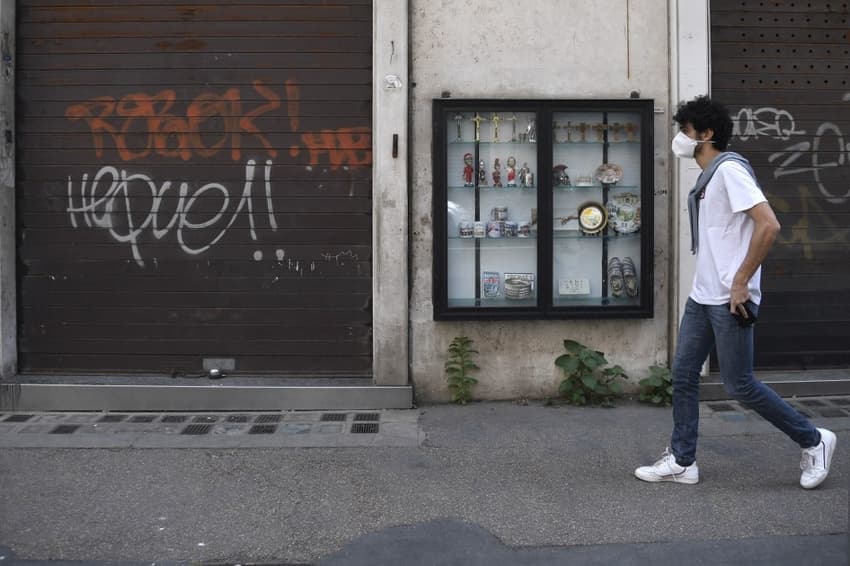Poverty rises to 15-year high in Italy amid coronavirus crisis

Poverty rates in Italy, whose economy has been battered by the coronavirus pandemic, rose last year to the highest level since records began in 2005, official data showed on Thursday.
The ranks of people in absolute poverty swelled by more than one million in 2020, to 5.6 million, out of a total population of around 60 million.
The number of households viewed as poor - where they cannot afford basic living necessities, including food - rose from 1.7 to 2 million, Italian statistics office Istat said.
In percentage terms, 9.4 per cent of individuals and 7.7 per cent of households were classed as poor - the highest level since the data series began.
In 2005, only three to four percent of Italian households and individuals were in absolute poverty, Istat said. The rate jumped after 2011, when Italy suffered a major debt crisis, and has remained relatively high since then.
Stime preliminari povertà assoluta: nel 2020 le famiglie in povertà assoluta sono oltre 2 milioni (il 7,7% del totale, 6,4% nel 2019); gli individui sono circa 5,6 milioni (oltre 1milione in più rispetto all’anno precedente) #istat https://t.co/yR2RnOip1D pic.twitter.com/aJzpDr4hcG
— Istat (@istat_it) March 4, 2021
Istat also said that average monthly household spending fell in 2020 to 2,328 euros ($2,800), down by 9.1 per cent compared with 2019, to the lowest value since 2000.
The statistics body reported that Italy’s economy shrunk by 8.9% in 2020. It is one of the worst in Europe, compared with a fall of 5.0 percent in Germany and 8.3 percent in France. Spain's economy fared even worse, with a drop of 11 percent.
Last year, Italy was the first country in Europe to be overwhelmed by the coronavirus pandemic.
To date, Covid-19 has killed almost 100,000 people in Italy and has caused the worst recession the country has seen since World War II.
READ ALSO:
- Italy reports one of Europe’s worst economic slumps in 2020
- Italy plans 'housewife bonus' to get more women into work
Over the course of 2020, gross domestic product (GDP) was down by nearly nine per cent and nearly 450,000 people - mostly women, younger workers and the self-employed - lost their jobs.
This has further exacerbated the gender gap in Italy’s labour market - in December 2020, 99,000 women lost their employment, versus only 2,000 men, Istat figures showed.
It’s hoped the outlook for Italy’s economy will improve following the appointment of Prime Minister, Mario Draghi.
Comments
See Also
The ranks of people in absolute poverty swelled by more than one million in 2020, to 5.6 million, out of a total population of around 60 million.
The number of households viewed as poor - where they cannot afford basic living necessities, including food - rose from 1.7 to 2 million, Italian statistics office Istat said.
In percentage terms, 9.4 per cent of individuals and 7.7 per cent of households were classed as poor - the highest level since the data series began.
In 2005, only three to four percent of Italian households and individuals were in absolute poverty, Istat said. The rate jumped after 2011, when Italy suffered a major debt crisis, and has remained relatively high since then.
Stime preliminari povertà assoluta: nel 2020 le famiglie in povertà assoluta sono oltre 2 milioni (il 7,7% del totale, 6,4% nel 2019); gli individui sono circa 5,6 milioni (oltre 1milione in più rispetto all’anno precedente) #istat https://t.co/yR2RnOip1D pic.twitter.com/aJzpDr4hcG
— Istat (@istat_it) March 4, 2021
Istat also said that average monthly household spending fell in 2020 to 2,328 euros ($2,800), down by 9.1 per cent compared with 2019, to the lowest value since 2000.
The statistics body reported that Italy’s economy shrunk by 8.9% in 2020. It is one of the worst in Europe, compared with a fall of 5.0 percent in Germany and 8.3 percent in France. Spain's economy fared even worse, with a drop of 11 percent.
Last year, Italy was the first country in Europe to be overwhelmed by the coronavirus pandemic.
To date, Covid-19 has killed almost 100,000 people in Italy and has caused the worst recession the country has seen since World War II.
READ ALSO:
- Italy reports one of Europe’s worst economic slumps in 2020
- Italy plans 'housewife bonus' to get more women into work
Over the course of 2020, gross domestic product (GDP) was down by nearly nine per cent and nearly 450,000 people - mostly women, younger workers and the self-employed - lost their jobs.
This has further exacerbated the gender gap in Italy’s labour market - in December 2020, 99,000 women lost their employment, versus only 2,000 men, Istat figures showed.
It’s hoped the outlook for Italy’s economy will improve following the appointment of Prime Minister, Mario Draghi.
Join the conversation in our comments section below. Share your own views and experience and if you have a question or suggestion for our journalists then email us at [email protected].
Please keep comments civil, constructive and on topic – and make sure to read our terms of use before getting involved.
Please log in here to leave a comment.